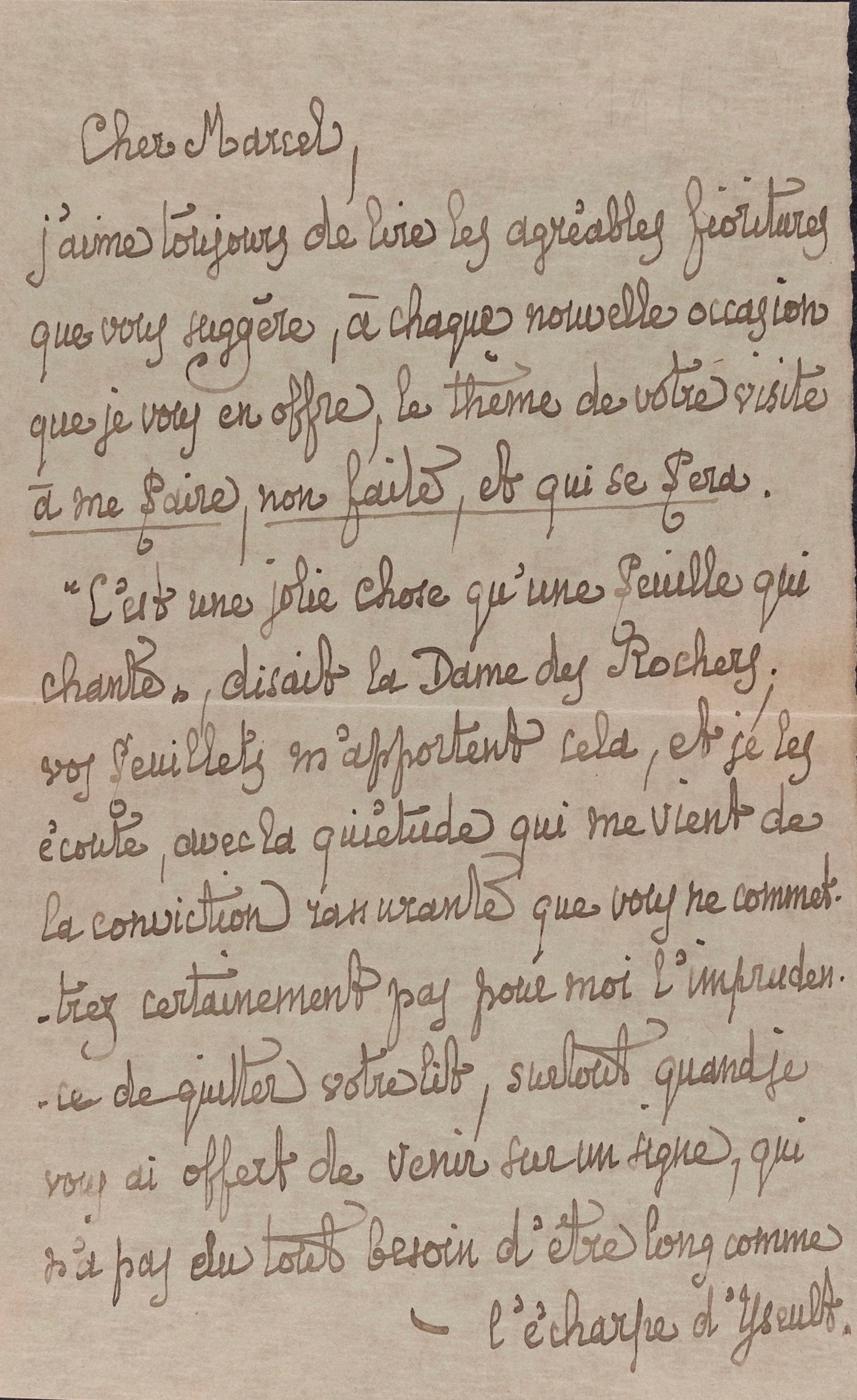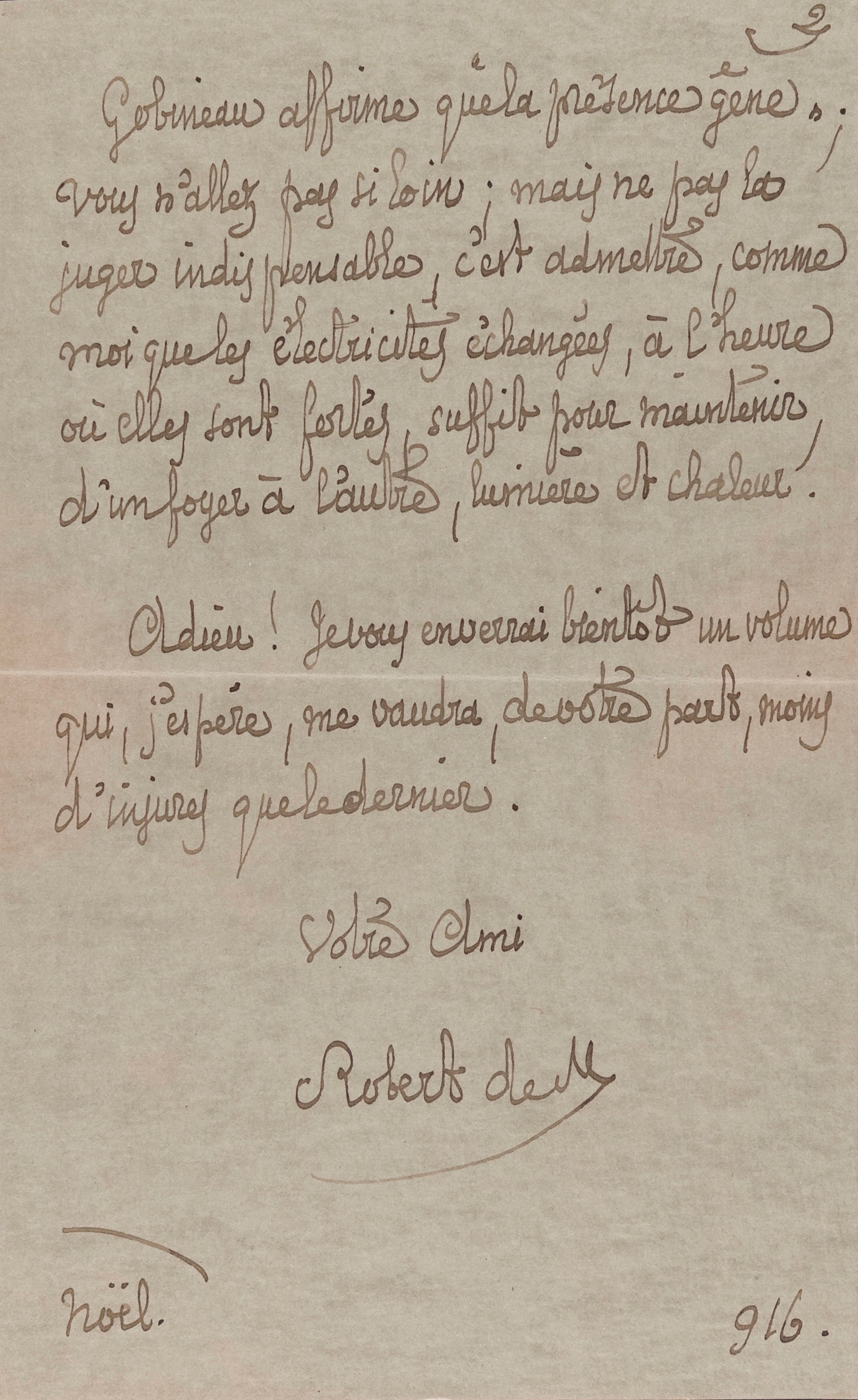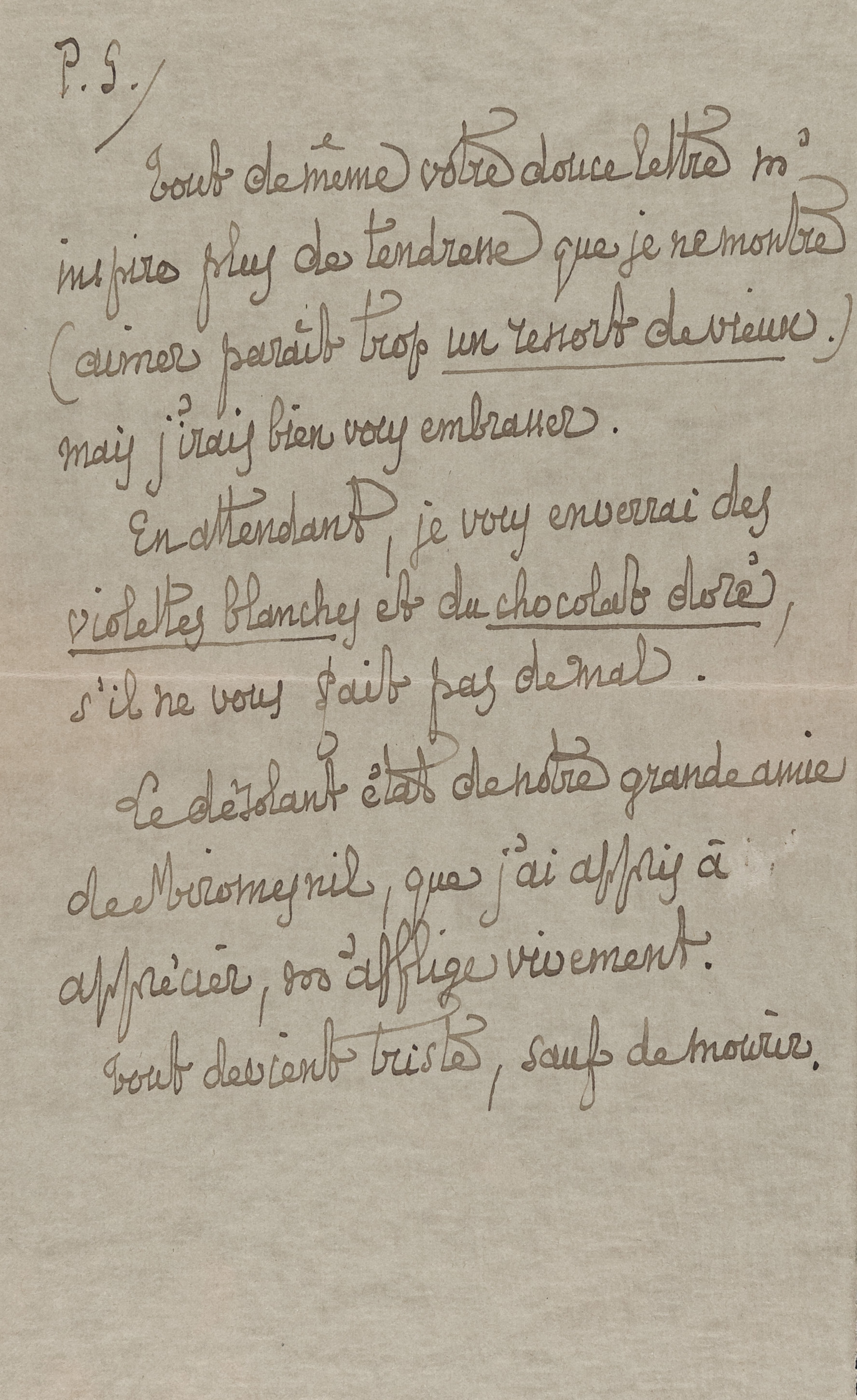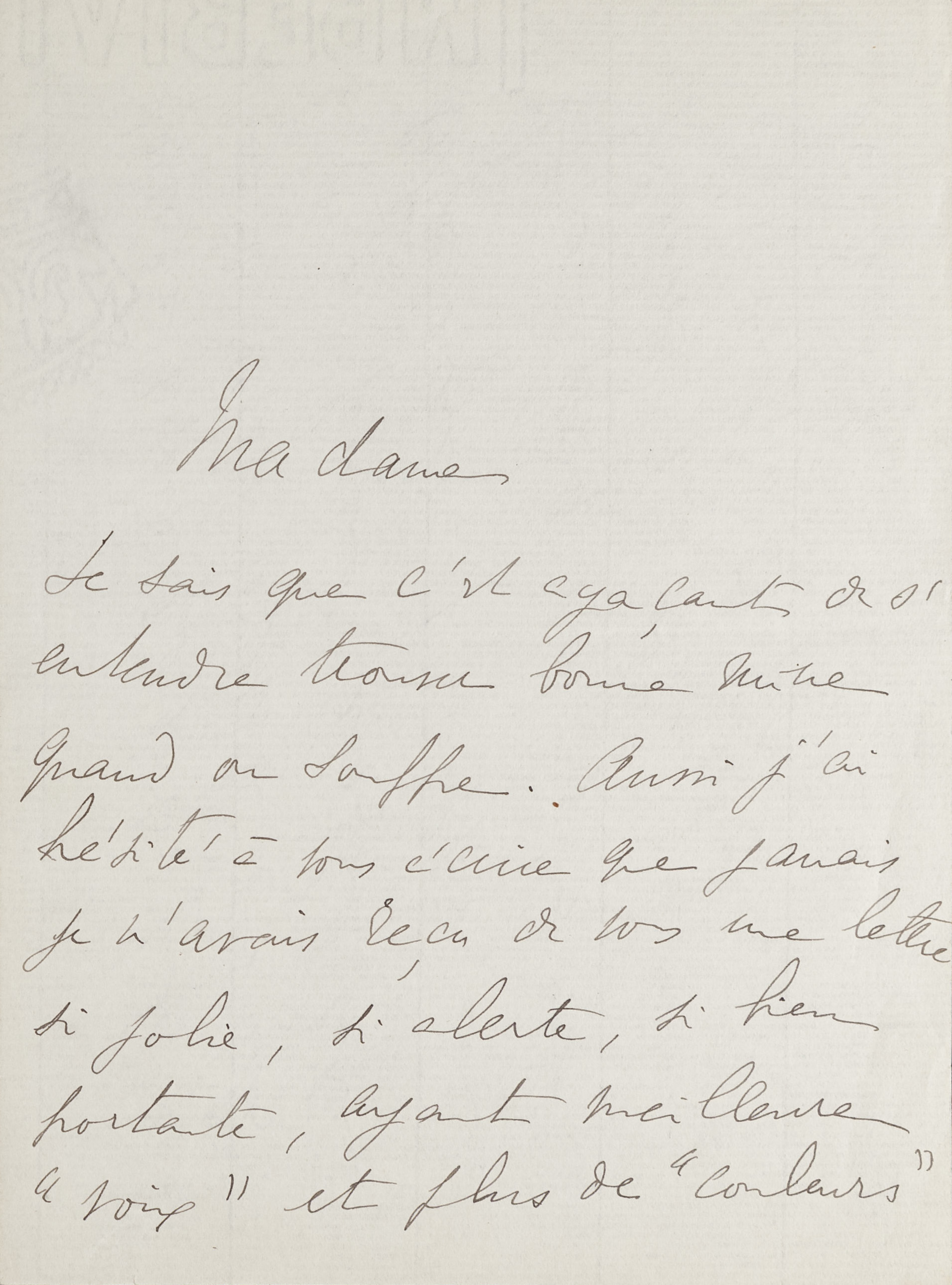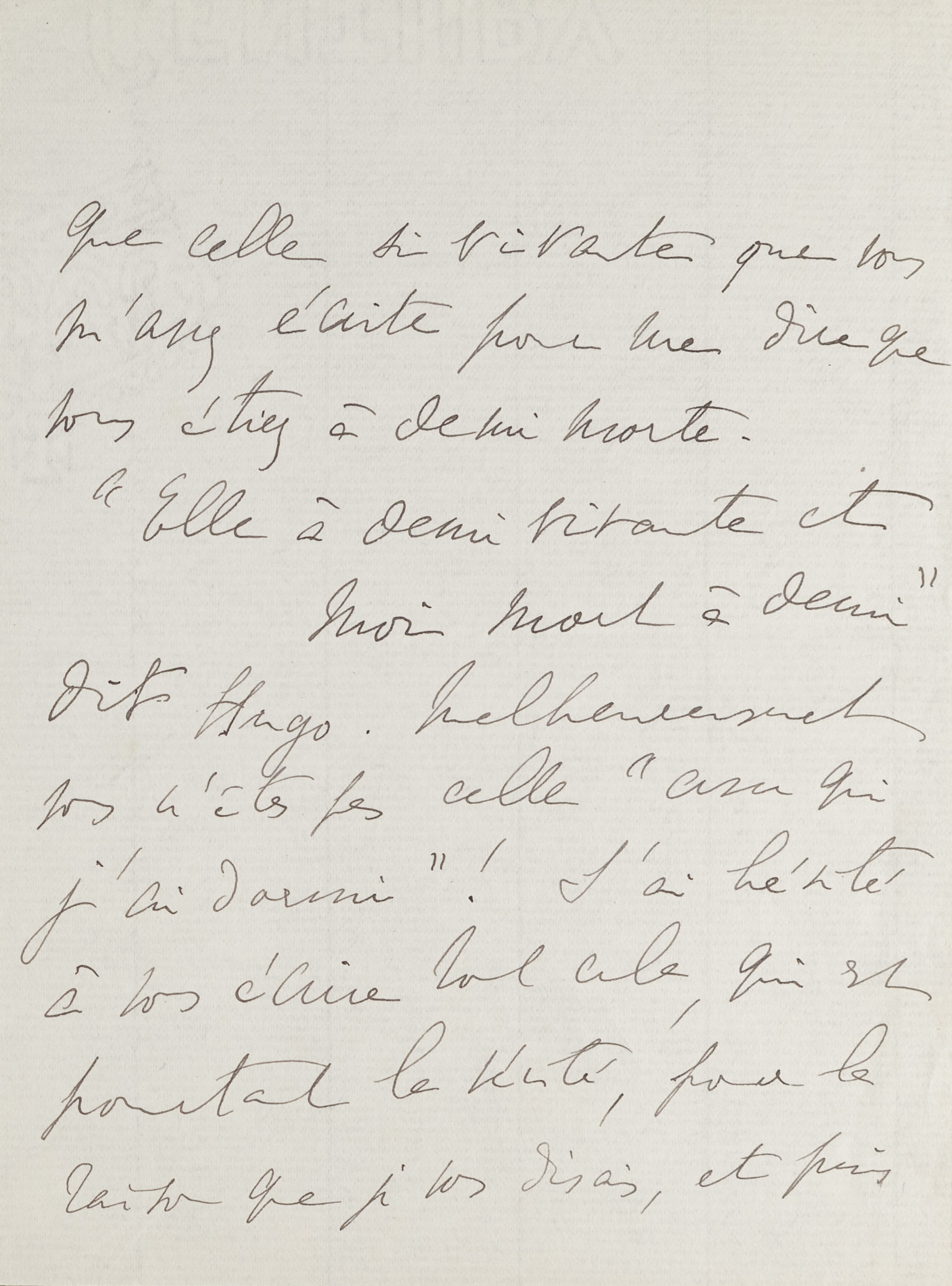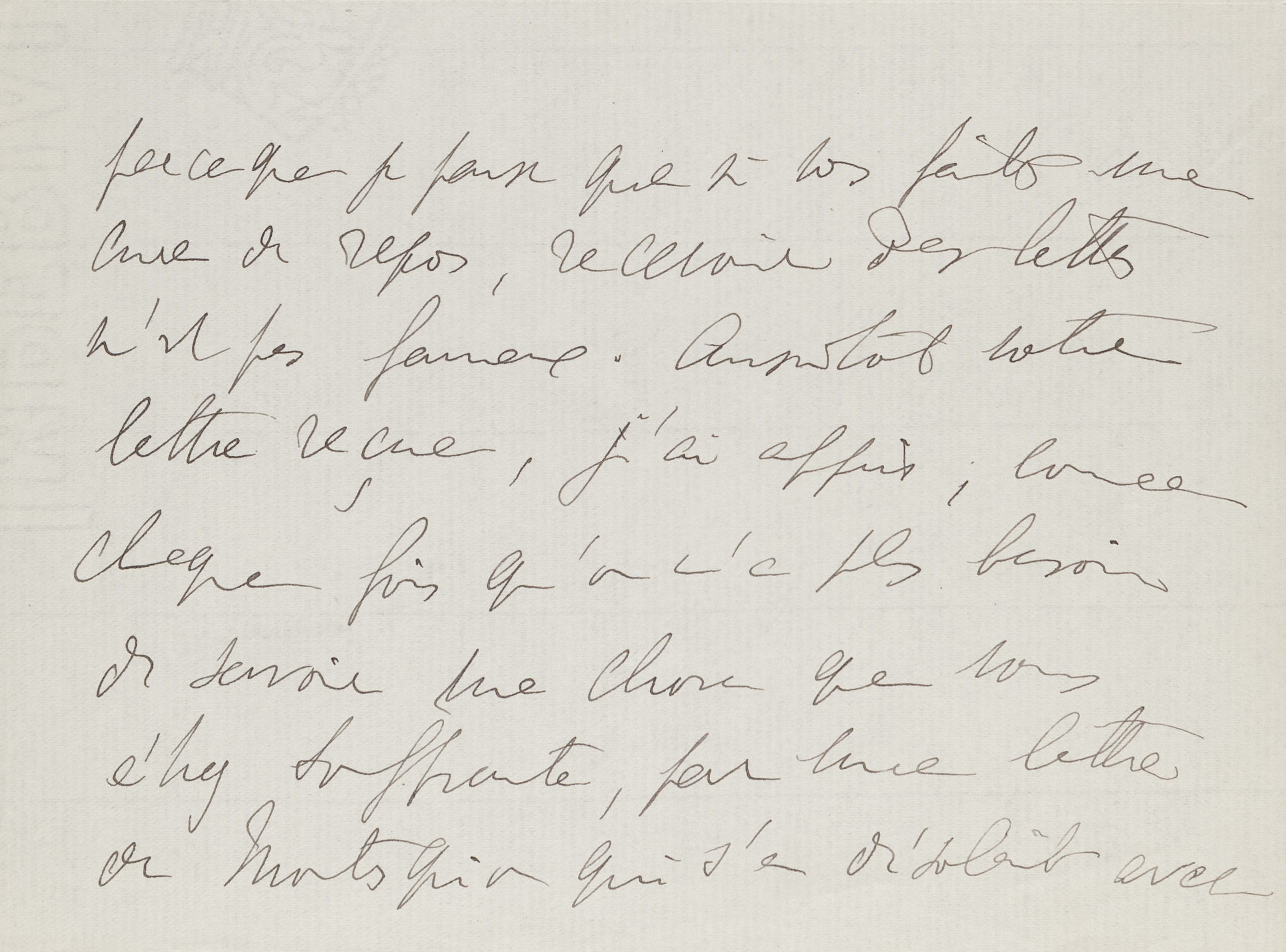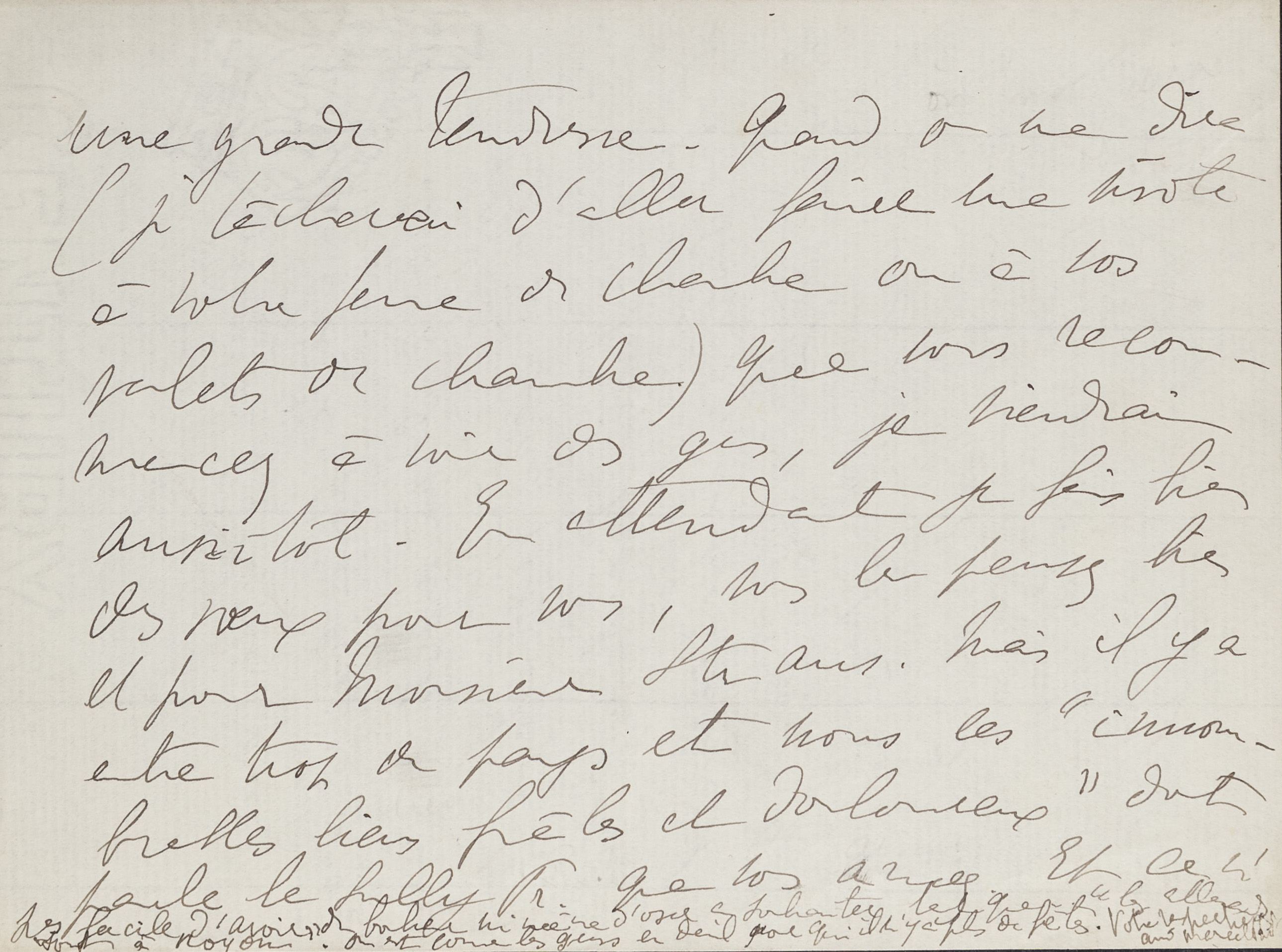By Emily Swisher, graduate student in French
Letter from Robert de Montesquiou to Marcel Proust, 25 December 1916 [1]
Dear Marcel,
I always enjoy reading the pleasant embellishments suggested to you, with each new occasion that I offer, by the topic of a visit to be made to me, yet unrealized, and which will happen soon [2].
“What a pretty thing, a page that sings” said the Lady of the Rochers [3]; your pages provide me this, and I listen to them, with the tranquility that comes from the reassuring conviction that you would certainly not, for me, commit the imprudence of leaving your bed, especially since I offered to come at the slightest sign, which need not be long like Yseult’s scarf [4].
Gobineau affirms that “presence discomforts” [5]; you do not go so far; but not to judge it indispensable is to admit, like myself, that exchanged electricity, at the time when it is strong, suffices to maintain, from one foyer to another, light and heat.
Farewell! I will soon send you a volume which, I hope, will earn me, on your part, fewer insults than the last.
Your friend,
Robert de M.
Christmas [1]916
P.S. – All the same your kind letter inspires in me more tenderness than I show (love seems too much like a trick of the elderly), but I would like to embrace you nonetheless.
In the meantime, I will send you white violets and gilded chocolate [6] if it does you no harm.
The sorry state of our good friend from Miromesnil [7], whom I have learned to appreciate, grieves me deeply.
Everything is becoming sad, except dying.
[1] Letter catalogued as Proust-Series 8 (Montesquiou to Proust) / Item Montesquiou 4-004, Rare Book and Manuscript Library, University of Illinois at Urbana-Champaign.
[2] Allusion to a letter from Proust (which P. Kolb dates to 16 September 1916) where he declines an invitation from Montesquiou. See Corr, vol. XV, p. 336-37.
[3] (Note by P. Kolb) “Ah! la jolie chose qu’une feuille qui chante !” Citation of a letter from Madame de Sévigné to Madame de Grignan, at Rochers, 26 June [1680]. See Lettres de Madame de Sévigné de sa famille et de ses amis. t. 6, p. 488.
[4] Likely allusion to the operatic drama, Tristan und Isolde, composed by Richard Wagner between 1857 and 1859. In the third act, a dying Tristan waits for a sign from his lover, which comes in the form of a waving scarf that Isolde brandishes from her approaching ship.
[5] Possible allusion to Arthur de Gobineau, a French diplomat, writer, and ethnologist whose most famous work was his Essai sur l’inégalité des races humaines, published in 1853.
[6] (Note by P. Kolb) Proust’s housekeeper, Céleste Albaret, recalls Montesquiou promising to send chocolates from Nice during a previous visit to the author. Proust apparently requested she discard any gifts sent by the Count, saying he wouldn’t be surprised if they contained poison (Corr, vol. XV, p. 342; see also Monsieur Proust, p. 314-315).
[7] (Note by P. Kolb) Reference to Geneviève Straus, who lived at 104 rue de Miromesnil (Corr, vol. XV, p. 342).
Letter from Marcel Proust to Madame Straus, [c. 27 December 1916] [8]
Madame,
I know it is irritating to hear that one is looking well when one is suffering. Therefore, I hesitated to write you that I have never received from you a letter as lovely, as attentive, in such good form, having a better “voice” and more “color” than the one, so lively, that you wrote to me to tell me that you were half dead [9].
“She, half living and me half dead,” says Hugo.
Unfortunately, you are not the one “with whom I slept” [10]! I hesitated to write all of this to you, although it is the truth, for the reason I just mentioned, and also, because I think that if you are undergoing a rest cure, you might not want to receive letters. No sooner had your letter arrived than I learned, like every time that one no longer needs to know something[,] that you were indisposed, in a letter from Montesquiou [11] who was saddened by this with great tenderness. When I am told (I will try to make a visit to your chambermaid or to your manservants) that you are seeing people once again, I will come immediately. In the meantime, I am sending well-wishes, have no doubt, to you and to Monsieur Straus. But there are, between too many countries and ourselves, “innumerable fragile and painful ties” which Sully Pr[udhomme], whom you like, wrote about [12]. And it [is] not easy to have happiness, nor even to dare to hope for any, as long as “the Germans are in Noyon” [13]. We are like people in mourning for whom there are no celebrations.
Your respectful friend,
Marcel Proust
[8] Letter catalogued as Proust-Series 1 / Lefebvre 036, Rare Book and Manuscript Library, University of Illinois at Urbana-Champaign.
[9] Allusion to the preceding letter from Madame Straus to Proust, which Kolb dates from 26 December 1916 (Corr., vol. XV, p. 343).
[10] (Note by P. Kolb) Reference to the poem “Booz Endormi” by Victor Hugo (1859), verses 45-48.
[11] Allusion to the above letter from Montesquiou that Proust received on 25 December 1916.
[12] (Note by P. Kolb) “D’innombrables liens frêles et douloureux” is a citation from “Les Chaînes” by Sully Prud’homme (1865-1866), verse 3. Prud’homme, a French poet, is notable for having won the first Nobel Prize in Literature in 1901.
[13] (Note by P. Kolb) Georges Clemenceau remarks in two editorials, once in 1915 and again in 1916, that the Germans are in Noyon – only “80 kilometers” from Paris (Corr, vol. XV, p. 345). Georges Clemenceau’s wartime editorials were published in L’Homme Enchaîné.
In these two letters, exchanged on and shortly after Christmas, 1916, the oppressive presence of World War I seems to weigh heavily on the correspondents. A week prior, on December 18, the German forces withdrew from the battle of Verdun, ending the long struggle for strategic position in the area. It was a grueling ten months, during which the combined French and German casualties were estimated at nearly one million. The general unease surrounding the situation is apparent in both Montesquiou’s and Proust’s missives. Montesquiou, in a sobering and pithy closing to his letter, claims that “everything is becoming sad, except dying.” Similarly, Proust admits to Madame Straus that any hope for happiness will be hard to find, so long as the “Germans are in Noyon.” The “celebrations” he mentions are likely a reference to the Christmas holiday, which, “like people in mourning,” he is unable to enjoy. The German occupation of Noyon was significant, as it was only 112 kilometers from Paris.
The letter from Montesquiou [14] to Proust, dated “Christmas” 1916, contains thinly masked malcontent: the Count sarcastically praises Proust for not committing “the imprudence” of leaving his bed for a visit. In a previous letter, dated 16 December, Proust affirms that he is so ill that cannot leave his bed “but two or three times per month” and predicts in advance that he will be unable to meet with Montesquiou (Corr, vol. XV, p 336). As one of his longest-standing correspondents, the Count is embittered by the writer’s repeated attempts to postpone a visit – indeed, he and Proust saw each other only very rarely after 1907. Despite their infrequent visits, Proust was nonetheless inspired by Montesquiou in his work on À la recherche: in the painstakingly penned flourishes that we see in this letter, full of literary allusions and multi-layered metaphors as well as in the bitterness of its reproaches, it is not difficult to recognize Charlus, the ostentatious aristocrat whose character Proust partly fashioned after the Count.
In the second letter, Proust’s pretext of being unable to leave his bed vanishes: he promises to visit Madame Straus [15] as soon as her health permits. She, like Proust, suffered from chronic illness, and the two often commiserated about their various ailments. A cultivated woman who was both an art collector and an amateur sculptor, Geneviève Straus hosted three successive salons in Paris attended by many aspiring artists, among whom figured Proust [16]. Here, Proust compliments her on her skill in crafting her previous letter to him, which is artfully poetic, even from her “death bed.”
While this dispatch is peppered with literary references, many of them evoking images of death, it is interesting to note Proust’s conclusion. As he draws a close to his letter with the customary formalities (“I am sending well-wishes, have no doubt, to you and to Monsieur Straus”), Proust seems to understand the hollowness of such formulas, and references a poem by Sully Prud’homme, fittingly titled “The Chains.” Madame Straus would no doubt have been familiar with the verse that Proust cites, from the first stanza of the poem: “I wanted to love everything, and I am unhappy / because I have multiplied the causes of my torments / innumerable fragile and painful ties / in the entire universe course from my soul to things” [17]. Proust’s mention of “too many countries and ourselves” recalls the poem’s “entire universe,” highlighting the confused despair of wanting to love all things in a time of such misery, as well as the far-reaching grip of the war which is depressingly pervasive. In leaving his reader with the image of chains and impossible happiness, Proust thus recognizes the irony in imparting well-wishes intended to bring cheerfulness at a time as hopeless as the one in which he is writing. “Like people in mourning,” he and everyone around him must put any hope for happiness on hold.
[14] See more information on Robert de Montesquiou.
[15] See more information on Geneviève Straus.
[16] See the biographical notice by Virginie Greene in Lettres, p. 1288-1289.
[17] “J’ai voulu tout aimer, et je suis malheureux / Car j’ai de mes tourments multiplié les causes / D’innombrables liens frêles et douloureux / Dans l’univers entier vont de mon âme aux choses.” From “Les Chaînes” by Sully Prud’homme, verses 1-4 (Poésies 1865-1866, p. 9). Translation by E. Swisher.
Works cited
Proust, Marcel. Correspondance. Ed. Philip Kolb. Paris: Plon (21 vols), 1970-1993.
Proust, Marcel. Lettres. Ed. Françoise Leriche with Caroline Szylowicz. Paris: Plon, 2004.
Prud’homme, Sully. Poésies 1865-1866. Paris: Lemerre, 1900.
Lettres de Madame de Sévigné de sa famille et de ses amis. Ed. M. Monmerqué, Paris, 1862.
